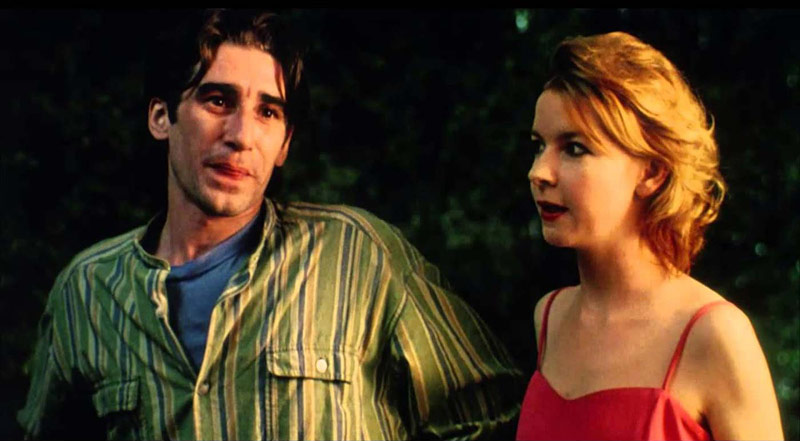Angel Baby, a story of doomed loved, and changing Australian accents
14 May 2024

A scene from Angel Baby, a film by Michael Rymer, depicting stars Jacqueline McKenzie and John Lynch.
Angel Baby, trailer, is the 1995 debut feature of Australian filmmaker Michael Rymer. You may have seen some of his other work: Battlestar Galactica, Hannibal, both TV series, and/or his 2012 feature, Face to Face, but likely you’ve not have heard of Angel Baby.
Filmed in Melbourne, Angel Baby tells the story of a doomed love shared by Kate (Jacqueline McKenzie) and Harry (John Lynch), both of whom are battling severe mental illnesses. I won’t say too much more about it, except to note this is an example of under-appreciated Australian cinema.
And, possibly, an exemplification of how Australian accents have changed over thirty years. I say this because I was amazed at how distinct, how strong, some of the actor’s accents were. I live in Australia, and am surrounded by people with Australian accents.
That’s obviously a no-brainer — well, to an extent — but it means generally Australian accents should sound “neutral” to me, because I’m exposed to them daily. Mostly, that is. I spend several days a week in Sydney, a diverse city. Here, Australian accents are only a sample of the many I hear daily.
Perhaps this accounts for why I found some of the accents in Angel Baby so pronounced, so unmissable, because in reality I am not wholly immersed by them. But it seems to me, to detect an accent, local to the region you reside in, which may otherwise seem indiscernible, you need to go outside that area, to begin to perceive it.
I spent several years in London, England not Canada, and after a few months could easily detect Antipodean accents. It was an odd sensation to speak on the phone to lifelong friends living down under, and notice their accents. To notice, effectively, my accent. I wonder if you can pick up my accent on the phone, to lift a line from the Waifs’ 2002 song, London Still.
Australian accents are said to fall into three main categories: broad, general, and cultivated. The Australian accents I detected in Angel Baby had to be in the board category. Of course, there are any number of explanations as to why the accents seemed pronounced.
Could it be I was hearing not wholly familiar Melbourne variations of the Australian accent? Or could it be some of the actors were asked to emphasise their accents, Angel Baby being an Australian production, and all. Perhaps Rymer wanted people, particularly overseas audiences, to make no mistake they were watching an Australian film.
But I also began wondering if the internet was playing some part in my hearing Australian accents on Australian soil? Angel Baby was made in 1995. The year after 1994, which Angela Watercutter, writing recently for Wired, described as the last year before culture began to migrate online.
Could it be imagined Australian accents were among this migration, where they began to blend with every other English language accent, every other accent full stop, and begin altering? Of course, accents from other global regions are still distinct. I have no trouble discerning, for example, Irish, North American, or English accents.
Or those of other cultures, because different accents stand out. But might thirty years of internet culture, monoculture perhaps, be making a difference? Unlike thirty years ago, today we are constantly hearing, constantly absorbing, the voices of speakers from across the globe, on the web, and social media.
Might this be resulting in accents — I don’t know — dissolving into each other a bit? Are we unwitting students of elocution lessons, being served up through the world wide web? Accordingly, a “normal” Australian accent of thirty years ago, may sound quite different today. But who knows? Perhaps I am only imagining this would-be diction.
One thing is certain though. If you have the chance, look at Angel Baby. If you’re a Kanopy member, it may be available in your region.
RELATED CONTENT
film, Jacqueline McKenzie, John Lynch, language, Michael Rymer, trends
